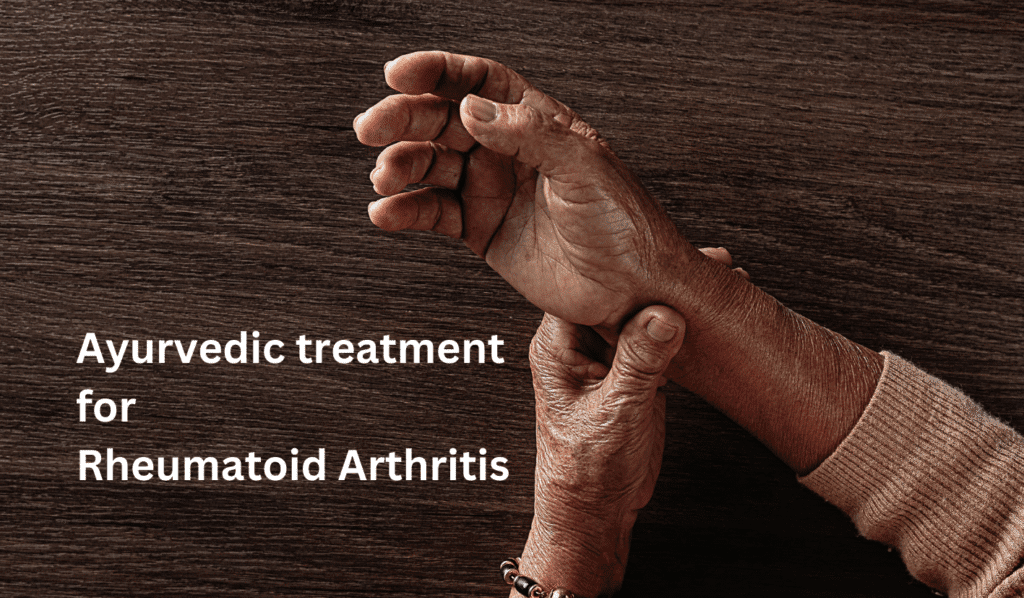Rheumatoid Arthritis (RA) is a chronic autoimmune disorder that causes inflammation in the joints, leading to pain, stiffness, swelling, and loss of joint function. While conventional medicine focuses on managing symptoms through medication like painkillers and immunosuppressants, Ayurveda addresses the root cause of the disease by considering both the physical and mental aspects of the disorder.
At Shantitheeram Ayurveda, a renowned center for authentic Ayurveda and Panchakarma in Kerala, we offer a holistic approach to treating RA through a combination of detoxification, personalized herbal therapies, diet, and lifestyle modifications, all aimed at balancing the body’s natural energies and promoting long-term relief.
Understanding Rheumatoid Arthritis in Ayurveda
In Ayurveda, Rheumatoid Arthritis is closely associated with a condition called “Amavata.” The term is derived from “Ama” (toxins) and “Vata” (the dosha responsible for movement in the body). Amavata occurs due to an imbalance in the digestive fire (Agni), leading to the formation of Ama, or toxic byproducts of undigested food. When these toxins accumulate in the joints and combine with aggravated Vata, it results in the symptoms characteristic of RA—pain, swelling, stiffness, and inflammation.
The underlying cause of Rheumatoid Arthritis, according to Ayurveda, can be linked to poor digestion, improper diet, stress, a sedentary lifestyle, and the suppression of natural bodily urges. An excess of Ama and an aggravated Vata dosha trigger inflammatory reactions in the body, which worsen with the cold and damp environment often associated with Vata aggravation.
Ayurvedic Approach to Treating Rheumatoid Arthritis at Shantitheeram Ayurveda
At Shantitheeram Ayurveda, our treatment for Rheumatoid Arthritis follows a comprehensive, personalized approach based on the individual’s constitution (Prakriti), the severity of the disease, and specific dosha imbalances. Our therapies aim to eliminate toxins, pacify aggravated Vata, and restore digestive fire, thus providing relief from symptoms and preventing further progression of the disease.
The key pillars of our treatment approach for RA include Panchakarma therapies, herbal medications, dietary changes, lifestyle modifications, and stress management techniques.
1. Panchakarma Detoxification Therapies
Panchakarma, the classical Ayurvedic detoxification process, plays a crucial role in the management of Rheumatoid Arthritis. By eliminating accumulated toxins (Ama) from the body, Panchakarma helps reduce inflammation, alleviate pain, and restore balance to the doshas. At Shantitheeram Ayurveda, we offer a range of Panchakarma therapies customized for each patient’s unique condition.
a. Snehana (Oleation Therapy)
Snehana is the application of medicated oils both externally and internally to soften and lubricate the body’s tissues. It helps in loosening the toxins, making them easier to eliminate. For RA patients, external oleation involves the use of medicated oils such as Mahanarayan oil, Ksheerabala oil, and Dhanwantaram oil, which help reduce joint stiffness, improve mobility, and pacify aggravated Vata.
b. Swedana (Sudation Therapy)
Swedana involves sweating therapies that help in eliminating toxins through the skin. This is often administered after oleation to further promote the expulsion of Ama from the body. At Shantitheeram Ayurveda, we use medicated steam baths or herbal poultices (Pinda Sweda) made from herbs like Nirgundi and Eranda (castor) to alleviate joint stiffness and swelling.
c. Virechana (Purgation Therapy)
Virechana, or therapeutic purgation, is used to cleanse the body’s internal systems by eliminating excess Pitta and toxins from the digestive tract. This helps to reset the digestive fire (Agni) and improve metabolism. For Rheumatoid Arthritis, Virechana helps reduce inflammation, restore digestive function, and prevent the recurrence of Ama formation.
d. Vasti (Enema Therapy)
Vasti is one of the most effective treatments for Vata disorders like Rheumatoid Arthritis. Medicated enemas (either oil-based, called Anuvasana Vasti, or decoction-based, called Niruha Vasti) are administered to directly target the colon, which is the seat of Vata dosha. This therapy helps in detoxifying the system, pacifying aggravated Vata, and reducing joint pain and inflammation. Herbal oils like Dashamoola and Sahacharadi are often used in Vasti treatments to provide deep nourishment to the tissues and relieve joint symptoms.
e. Raktamokshana (Bloodletting Therapy)
In some cases, bloodletting therapy is used to purify the blood and reduce inflammation in the joints. This therapy helps in clearing out Ama from the blood, thereby improving circulation and reducing pain and swelling in the affected joints.
2. Herbal Medications
In Ayurveda, herbal formulations are a cornerstone of treatment for chronic conditions like Rheumatoid Arthritis. These medications work to detoxify the body, pacify doshas, and rejuvenate joint tissues. At Shantitheeram Ayurveda, we prescribe specific herbs and formulations based on the patient’s unique constitution and disease presentation.
a. Guggulu (Commiphora mukul)
Guggulu is one of the most important herbs used in the treatment of Rheumatoid Arthritis. It has powerful anti-inflammatory and detoxifying properties that help reduce joint swelling, pain, and stiffness. Formulations such as Yogaraj Guggulu and Simhanad Guggulu are commonly used to treat RA by removing toxins and balancing Vata.
b. Rasna (Pluchea lanceolata)
Rasna is a highly effective herb for alleviating joint pain and inflammation. It pacifies Vata dosha and is used in herbal decoctions and pastes to improve joint mobility and reduce stiffness.
c. Eranda (Castor Oil)
Castor oil is widely used in Ayurvedic treatment for its Vata-pacifying and detoxifying properties. It helps in reducing pain and stiffness in the joints. Eranda Taila is often taken internally or applied externally to ease symptoms of Rheumatoid Arthritis.
d. Ashwagandha (Withania somnifera)
Ashwagandha is a rejuvenating herb that helps improve strength, reduce inflammation, and enhance the body’s ability to cope with stress. In RA, it helps in reducing fatigue, strengthening the joints, and promoting overall vitality.
e. Triphala
Triphala is a traditional Ayurvedic combination of three fruits—Amalaki, Haritaki, and Bibhitaki—that works as a gentle detoxifying agent. It supports digestive health, enhances metabolism, and prevents the accumulation of Ama in the body.
f. Shallaki (Boswellia serrata)
Shallaki, also known as Indian frankincense, is an excellent anti-inflammatory herb that helps reduce joint pain and stiffness. It improves mobility and prevents the breakdown of cartilage, making it highly beneficial for patients with RA.
3. Dietary and Lifestyle Modifications (Pathya-Apathya)
In Ayurveda, the importance of diet in managing diseases like Rheumatoid Arthritis cannot be overstated. A specific diet, known as Pathya, is recommended to balance Vata and Pitta doshas and prevent the formation of Ama. At Shantitheeram Ayurveda, we provide personalized dietary guidelines for each patient based on their constitution and the severity of their condition.
a. Anti-inflammatory Diet
Patients are advised to follow a diet that includes light, warm, and easily digestible foods to reduce Vata and prevent the accumulation of toxins. Fresh vegetables, whole grains, and lean proteins like mung dal are recommended, along with spices such as turmeric, ginger, and cumin to enhance digestion and reduce inflammation.
b. Avoiding Aggravating Foods
Foods that are cold, heavy, and difficult to digest—such as fried, processed, and dairy-rich foods—should be avoided. These foods can aggravate Vata and lead to the formation of Ama, worsening Rheumatoid Arthritis symptoms.
c. Hydration
Staying well-hydrated is essential for maintaining joint health and supporting detoxification. Herbal teas made from ingredients like ginger, coriander, and fennel can help in improving digestion and reducing inflammation.
d. Regular Eating Routine
A regular eating schedule helps to maintain healthy digestion and prevents the accumulation of toxins. Skipping meals or eating irregularly can lead to indigestion and aggravate Vata dosha.
4. Yoga and Pranayama for Rheumatoid Arthritis
Stress is a known trigger for autoimmune conditions like Rheumatoid Arthritis, and managing stress is a key component of Ayurvedic treatment. At Shantitheeram Ayurveda, we integrate yoga, pranayama (breathing exercises), and meditation into the treatment plan to help patients manage stress, improve flexibility, and support mental well-being.
a. Yoga Asanas
Gentle, low-impact yoga postures (asanas) can help improve joint flexibility, reduce stiffness, and enhance overall mobility. Poses like Vrikshasana (Tree Pose), Trikonasana (Triangle Pose), and Bhujangasana (Cobra Pose) are particularly beneficial for patients with RA, as they promote circulation and strengthen the muscles around the joints.
b. Pranayama
Breathing exercises like Anulom Vilom (Alternate Nostril Breathing) and Bhramari (Bee Breath) are practiced to calm the mind, reduce stress, and balance the doshas. These techniques help in improving lung capacity and reducing inflammation in the body.
5. Stress Management and Mental Well-being
Mental health plays a significant role in managing autoimmune conditions like Rheumatoid Arthritis. Practices like meditation and mindfulness are integrated into the treatment program at Shantitheeram Ayurveda to help patients cope with stress, anxiety, and emotional imbalances. Meditation techniques such as Mantra Meditation and Guided Visualization are employed to promote relaxation and support the healing process.
Conclusion
Rheumatoid Arthritis is a complex condition that requires a multi-faceted treatment approach. At Shantitheeram Ayurveda, our personalized Ayurvedic treatments offer a natural and effective solution for managing RA by addressing the root cause of the disease, detoxifying the body, balancing the doshas, and promoting overall health and well-being. Through the use of Panchakarma therapies, herbal medications, dietary modifications, and stress management techniques, Ayurveda provides long-term relief from Rheumatoid Arthritis and improves the quality of life for those suffering from this chronic condition.

